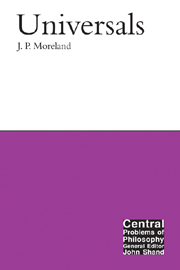Book contents
- Frontmatter
- Contents
- Preface and acknowledgements
- 1 The problem(s) of universals
- 2 Extreme nominalism and properties
- 3 Moderate nominalism and properties
- 4 Minimalist realism: Wolterstorff's kinds and Armstrong's properties
- 5 Traditional realism: properties are abstract objects
- 6 Traditional realism: issues and objections
- 7 The individuation of particulars
- Notes
- Bibliography
- Index
4 - Minimalist realism: Wolterstorff's kinds and Armstrong's properties
- Frontmatter
- Contents
- Preface and acknowledgements
- 1 The problem(s) of universals
- 2 Extreme nominalism and properties
- 3 Moderate nominalism and properties
- 4 Minimalist realism: Wolterstorff's kinds and Armstrong's properties
- 5 Traditional realism: properties are abstract objects
- 6 Traditional realism: issues and objections
- 7 The individuation of particulars
- Notes
- Bibliography
- Index
Summary
In Chapter 2, reasons were given for rejecting extreme nominalism (EN). Among other things, EN is what has been called a blob theory regarding concrete particulars. A blob theory of ordinary concrete particulars is consistent with a mereological analysis of those particulars as wholes constituted by separable parts; but a blob theory renders concrete particulars structureless entities with no internal differentiation of properties and relations within those concrete particulars. In this sense, EN treats concrete particulars as simples and thereby fails to acknowledge that the redness, circularity, size and other features of Socrates are real entities that are neither identical to each other nor to Socrates as a whole.
A similar conclusion surfaced in Chapter 3 regarding moderate nominalist treatments of abstract particulars according to which they are simple entities that somehow sustain exact similarity to other members of their associated similarity classes, individuation and location. Moderate nominalism is a blob theory regarding abstract particulars and this, along with other things, is a serious problem sufficient to justify the search for a more adequate treatment of properties and their instances.
Now all of this is good news for advocates of traditional realism. As will be argued in Chapter 5, traditional realism is the view that a property is a universal construed as a multiply exemplifiable abstract entity that is a numerically identical constituent in each of its instances. Thus, instances are not simples for a traditional realist; they are complex entities.
- Type
- Chapter
- Information
- Universals , pp. 74 - 96Publisher: Acumen PublishingPrint publication year: 2001

